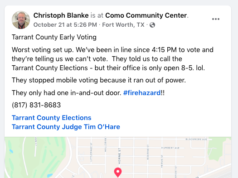A simple reason explains why Fort Worth Weekly was among the country’s first news media to point out that fracking by natural gas drillers could threaten water supplies, and yet regulatory agencies weren’t paying attention.
A Weekly reporter lived outside of town and relied on a well for household water. After a new technique of gas drilling called “fracking” began to be used near his home, he wondered if it might affect his water well. He called the Tarrant Regional Water District, where he got no answers but did discover that each frack job can use millions of gallons of water — which then becomes toxic.
Could the drillers suck his water well dry or poison it with toxins? Was there enough water in the aquifers to handle all the gas drilling in the Barnett Shale?
He called various state agencies, beginning with the Texas Commission on Environmental Quality, and discovered that none were paying much attention. Each regulatory agency pointed him to a different agency. Eventually it became clear that the Texas Railroad Commission was charged with overseeing gas drilling but was more interested in protecting the energy companies.
Eight years and many Weekly stories later, not much has changed. State regulatory agencies are still hands-off when it comes to gas drillers. Regular folks harmed by gas drilling are usually out of luck. Energy companies and their deep-pocketed lobbyists and stables of attorneys have stacked the rules in their own favor.
So it was deja vu all over again when Static read the April 24 front-page story “Who’s Keeping Watch?” in The Dallas Morning News. Environmental writer Randy Lee Loftis reported that various Texas regulatory agencies knew that West Fertilizer Co. was stockpiling thousands of tons of “potentially explosive” ammonium nitrate near houses and schools. An explosion on April 17 killed 14 people, injured many others, destroyed homes and a school, left a large crater, and changed the town of West forever.
Texas Commission on Environmental Quality chairman Bryan W. Shaw denied responsibility for oversight: “We don’t, at TCEQ, evaluate the explosive threat associated with these types of facilities,” the News quoted him as saying.
Shaw pointed the reporter to other state and federal regulatory agencies, but they denied responsibility as well. The reporter never found anyone who admitted to being in charge of regulating ammonium nitrate storage. He noted that “there are no uniform federal rules for ammonium nitrate storage, and state rules vary.”
Welcome to Texas, where toxic industries with the potential to kill large numbers of people are given carte blanche, but residents must jump through hoops to get their vehicles inspected each year.













At least one media outlet is willing to publish what should be very obvious to anyone who has been paying any attention at all over the past several years.
Jump through hoops to get a car inspected? Not at all. Its an easy and quick process.
Maybe it is quick and easy for you. It is not for me. It costs about $40 and I have to use up part of my Saturday to go get it done even though I have a fairly new car that has no problems. If I owned a coal plant I could belch out crap into the air all day and night and Rick Perry would throw me a party.
And how many of those agency heads are are big contributors to the Perry campaign…..